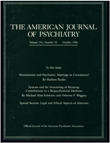Neuroendocrine dysfunction in schizophreniform disorder: correlation with six-month clinical outcome
Abstract
The thyrotropin-releasing hormone (TRH) stimulation test and the dexamethasone suppression test (DST) were administered to 21 patients with schizophreniform disorder at the time of admission for acute illness: 9 showed dysregulation on one or the other test. Seventeen patients followed for 6 months were divided into two groups: those with persistent dysfunction and/or psychotic symptoms and those in full remission. Only 1 of 7 patients (14%) with persistent dysfunction in contrast to 7 of 10 patients (70%) in full remission revealed dysregulation on either test. Neuroendocrine challenges may be useful in the early assessment of first-break psychotic patients, and neuroendocrine dysregulation may be a predictor of episodic illness with a better prognosis.
Access content
To read the fulltext, please use one of the options below to sign in or purchase access.- Personal login
- Institutional Login
- Sign in via OpenAthens
- Register for access
-
Please login/register if you wish to pair your device and check access availability.
Not a subscriber?
PsychiatryOnline subscription options offer access to the DSM-5 library, books, journals, CME, and patient resources. This all-in-one virtual library provides psychiatrists and mental health professionals with key resources for diagnosis, treatment, research, and professional development.
Need more help? PsychiatryOnline Customer Service may be reached by emailing [email protected] or by calling 800-368-5777 (in the U.S.) or 703-907-7322 (outside the U.S.).



